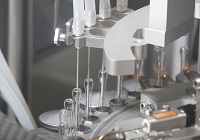Injectables
by Dr. Miek Jong
Louis Bolk Institute
Injectables are therapeutically applied in anthroposophic medicine and homeopathy for a wide range of conditions.
Injectables as applied in anthroposophic medicine and homeopathy have an excellent safety profile
Anthroposophic and homeopathic practitioners often favour injectables as their first choice of medication in the treatment of acute and chronic conditions because of the anticipated quicker and better clinical effect, the possibility to control compliance (the injection is generally given by the physician/therapist or nurse), and the fact that the exact location of administration can be chosen. Other advantages of injectables are that active ingredients do not have to pass the gastrointestinal tract or skin barrier, and that the point of injection can be chosen in line with acupuncture trigger points to achieve an optimal systemic or local effect.
Nowadays, more than 90 million medicinal ampoules for injection as used in homeopathy and anthroposophic medicine are sold per year worldwide. German anthroposophic and homeopathic manufacturers produce over 90% of these ampoules. Despite the extensive use of injectables in anthroposophic and homeopathic clinical practice, there is little data published on the safety of these medicinal products.
Nowadays, more than 90 million medicinal ampoules for injection as used in homeopathy and anthroposophic medicine are sold per year worldwide. German anthroposophic and homeopathic manufacturers produce over 90% of these ampoules.
A recent study evaluates the safety status of anthroposophic and homeopathic injectables through a systematic evaluation of reported side effects in the safety databases of German manufacturers. Our evaluation demonstrated that within a period of 10 years, a total of 303 million injectables (ampoules) were sold in Germany. During this same period, just over 1000 side effects (1180) were reported. Our calculations demonstrated that the chances of experiencing a side effect with homeopathic and anthroposophic injectables are extremely rare - less than four people in one million that are injected would experience a side effect. Furthermore, most of the reported side effects were known side effects and mild of nature such as pain, swelling and redness at the site of injection.
This is the first study to provide a thorough systematic evaluation of collected and spontaneous reported side effects for injectables of anthroposophic and homeopathic medications. The results indicate that injectables as applied in anthroposophic medicine and homeopathy have an excellent safety profile. This includes complex products and those that are not highly diluted. These results provide reliable data for risk-benefit ratio calculations of anthroposophic and homeopathic injectables as demanded by regulatory authorities in the marketing authorisation procedures of these medicinal products.
ECHAMP reports
- The importance of injectables as used in homeopathic and anthroposophic medicine, ECHAMP Summary Sheet, 2007
- Injectables for Subcutaneous Administration as used in Homeopathic and Anthroposophic Medicine, ECHAMP Position Paper 2003
Further information
- Adverse drug reactions to anthroposophic and homeopathic solutions for injection: a systematic evaluation of German pharmacovigilance databases, Miek C. Jong, Mats U. Jong and Erik W. Baars, 2012
- Homeopathic Injectables: Importance of the parenteral administration of homeopathic and anthroposophic remedies - Risks and benefits
Dr. Wilfried Stock, 2002


